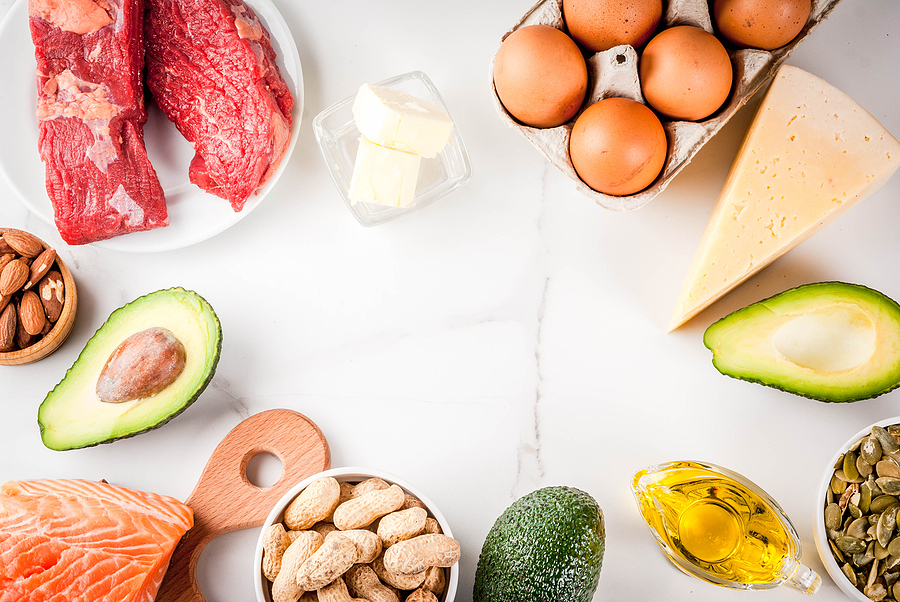Weight loss is a hot topic among the women I work with, but with all the diet plans out there they often come to me confused and frustrated – it’s no wonder!
Each diet has it’s “hook” – eliminate carbs, forget the fat, high protein, high fat, count points, count calories… the list goes on and on. Often, women have tried them all, and nothing has had the long term results they’re looking for.
Lately, many of the women I’ve talked to have been asking about the ketogenic diet.
The headlines in women’s magazines at the checkout counter make grand promises like, Shortcut Keto – Lose 19 Pounds in a Week and She lost 245 Lbs on Ultra Keto.
Sounds too good to be true, doesn’t it?
The reality is, that kind of rapid weight loss isn’t typical, and even when it happens, the weight often comes back once you begin to eat in regular patterns again.
Success due to any diet that isn’t part of a long term lifestyle is difficult to maintain. There are no shortcuts, and the “Ultra” form of anything is probably too rigid to keep up for long.
That said, eating a ketogenic diet can absolutely help some women jumpstart their weight loss and experience initial success to help keep them motivated for the long haul. And for some women, ketogenic eating can be the best long term lifestyle dietary pattern.
It’s important to truly understand what a ketogenic diet is, why it works for some women, and what you can do to maintain weight loss once it happens.
It’s also critical to understand that every woman is a unique individual and the right diet for one might be the exact wrong way to eat for another.
Let’s take a look at what ketogenic really means, how it works, and how to discover the best plan for you. Then I’ll give you some healthy eating tips that apply regardless of the diet you’re on.
What is a ketogenic diet?
The short answer is that it’s a diet focusing on very low carbs and high fat. But it’s not quite that simple – there are some things that are explicitly off limits, and you can’t just eat any carbs you want.
The ketogenic diet calls for reducing carbohydrate consumption dramatically (only 5 to 10% of what you consume should be carbs) and increasing fat consumption (55 to 60 % of what you eat).
The remainder of your diet should be protein. This puts your body into ketosis, a metabolic state that helps your body become very efficient at burning fat for energy.
There are a few different types of ketogenic diets. The typical keto diet is described above.
A cyclical ketogenic diet is exactly what it sounds like – several days of a keto plan followed by a couple of higher carb days. A targeted keto diet allows for carb consumption around intense physical activity. Most research has focused on a standard or higher protein keto plan.
Why is ketosis a desired state?
When your body is in ketosis, it produces ketone bodies that can be used for energy by the heart, muscles, and kidneys as well as providing energy to the brain.
Evidence has shown that ketosis can be beneficial in the treatment of epilepsy, which is where the original diet stemmed from, as well as reducing risk of diabetes and heart disease.
Because these ketones are produced in small concentrations during nutritional ketosis, the blood pH is not changed. Unlike ketoacidosis, which is life threatening because of the large concentrations of ketones produced that alter the pH, diet induced ketosis is considered quite safe.
What’s the difference between keto and paleo?
Both keto and paleo diets focus on limiting carbohydrate consumption. Each has been shown to benefit health and stimulate weight loss.
Neither diet allows processed foods or grains (even whole grains), but there are some key differences in the foods that are allowed. Keto focuses more on fat, while paleo has an emphasis on protein.
On a keto diet, carbs come from keto approved vegetables or a small number of fruits (mostly berries).
A paleo diet focuses on food that our long ago ancestors ate (through hunting/gathering). This stems from the belief that our bodies aren’t well equipped to deal with modern-day foods.
The growing and production processes widely used introduce a number of potent toxins into our bodies, so this certainly makes sense to me.
Whatever diet you follow, avoiding processed food and eating organic as often as possible are important to good health.
Why does your body need fat?
When thinking about a keto diet, many women are fearful of the high percentage of fat they’re expected to consume.
I know that fat has become the enemy in the minds of many women. But that’s a misconception I am trying hard to dispel because the truth is, your body needs fat.
Decades ago, the sugar industry embarked upon a campaign to place the burden of poor health squarely on fat to take the attention off of the fact that sugar could lead to major health issues. The media jumped on the bandwagon and soon everyone was convinced that fat should be avoided at all costs.
The problem is, there was no distinction between unhealthy fats (which absolutely should be avoided) and healthy fats that are essential for good health.
Here’s another thing that may surprise you: healthy fat can help you lose weight!
Natural fat increases immunity, provides energy, stabilizes blood sugar and helps control hunger. When you eat fat, your stomach and intestines release a hormone that triggers a “full” feeling.
Your body uses fat in many critical processes, including the production of estrogen and other sex hormones.
Fats also help your body maintain warmth, absorb some nutrients, and protect your organs. Omega-3 fatty acids are particularly important for maintaining good health.
Weight Loss and Ketogenic Diet
Some people hear of the high fat content in a ketogenic diet and think it couldn’t possibly be effective for weight loss. But because of all the ways your body uses fat, that’s simply not true.
Research has shown that a ketogenic diet, when properly understood and supervised, can be an effective treatment for obesity.
Several studies have also demonstrated that the ketogenic diet is on par with a low fat diet when it comes to losing weight. A meta-analysis even indicated that a ketogenic diet may be slightly more effective than a low fat diet.
One small study had quite dramatic results. Of 34 older adults, those who followed a ketogenic diet for 8 weeks lost almost five times the total body fat as those who followed a low fat diet.
Other research has shown that when following a ketogenic diet, weight loss can be achieved without counting calories or tracking what you eat.
Factors contributing to the success of the ketogenic diet are likely increased ketones, lower blood sugar levels, and improved sensitivity to insulin.
What else can a ketogenic diet do for your health?
As I said earlier, the ketogenic diet was originally used to treat epilepsy. Research has since shown that this way of eating may have a positive effect on many other conditions, including heart disease, cancer therapy, and PCOS.
A keto diet has also been shown to impact other neurological conditions, including reducing symptoms and slowing progression of Alzheimer’s disease, improving symptoms of Parkinson’s disease, and decreasing the negative impact of traumatic brain injuries.
While research in many of these areas isn’t definitive, the results are encouraging. Many difficult to treat conditions may benefit from adopting healthy dietary patterns, including a keto diet in some cases.
Keto as a Lifestyle?
Fad diets fail because they are difficult to sustain.
Changing how you eat for a few weeks or months may be worth it to drop unwanted pounds or alter negative symptoms of various health conditions. But is it something you can commit to long term? Does the benefit outweigh the risks?
That is, of course, a personal decision. But it’s important to know that there are some risks to staying on the keto diet long term, including low protein levels in the blood, kidney stones, fat build up in the liver, and micronutrient deficiencies.
When beginning a keto diet, some side effects are common enough to be known as the “keto flu.” These include nausea, vomiting, headache, dizziness, constipation and fatigue. Typically, these last just a few days to a few weeks.
For some people, particularly those taking certain medications (such as for diabetes) and those with specific health issues, the ketogenic diet is not recommended. As with any weight loss program, you should consult with your healthcare provider before trying a ketogenic diet.
I believe that when it comes to weight loss, following a diet as restrictive as the keto diet can be very beneficial initially, to experience success and stay motivated.
Once the goal weight is reached, I encourage developing a healthy plan that you can stick to for the long term, tailored to each individual’s genetic profile and lifestyle.
Discover the dietary patterns that are right for YOU
One of the first things I tell women when they come to me for help with weight loss is this: You are a unique individual.
Far too many take other people’s success stories as evidence that they should follow the exact same plan. But the truth of the matter is that there are so many factors that impact what will (and won’t) work. And some of these we have no control over – like genetics.
At my practice, I saw two sisters, each of whom had more than 100 pounds to lose. Terri had been following a Keto diet, while Janet had been doing a very low fat plan.
Neither one was having any success. I ran their genetic profiles and found that they were doing the exact opposite of what they needed.
Terri’s profile suggested that her body would not process fat well, so she needed to follow a low fat plan. Janet’s body, on the other hand, needed more fat. Even as sisters, their individual needs were vastly different.
Once they swapped, they both found the success they were hoping for. And the best part is they maintained it – even when they went on a cruise, they each stayed within two pounds of their goal weight.
That’s because they finally understood their unique needs, and were able to build a lifetime pattern of eating around those differences.
There are so many different ways of eating.
Many of the popular weight loss plans can help women drop the weight they want if they’re trying the right one. It’s not enough to jump on the fad diet bandwagon.
And once the weight is lost, it’s even more important to know the long term plan that’s right for you. Very few people can sustain an extremely rigid set of rules forever.
The good news is, you don’t have to!
Eliminating unhealthy habits, like fast food and processed food, in favor of home cooked meals filled with a variety of vegetables is more important than sticking to a narrow list of “approved foods” or counting calories for a lifetime.
Building healthy habits, centered around the information you gain about your own body, is key.
If you know that dairy makes you bloated and uncomfortable, for instance, you can find adequate substitutes like coconut milk or almond milk that allow you to feel satisfied without sabotaging your efforts.
Knowing that your genetics suggest low fat (or low carb, or mixed) is right for you helps guide your regular choices.
After your weight loss goals have been met, most women can even begin to live by the 80/20 rule without ending up right where you started. That means eating well 80% of the time, so you can indulge in an occasional dessert or glass of wine the other 20%.
Developing habits around when you eat can also help sustain weight loss.
Research indicates that intermittent fasting is an eating pattern that not only helps maintain a healthy weight, but also comes with a host of other health benefits. In the context of a ketogenic diet, intermittent fasting may help you enter ketosis faster.
Fasting in general is a time honored tradition for both religious and health reasons. Research is currently underway studying the impact that fasting before and/or after chemotherapy can have on the treatment of cancer.
Whether you fast deliberately or not, it’s a good idea to stop eating by 7 pm.
Digestion is a complex process, and allowing your body time to recover and do its job is important. Not eating too close to bedtime can help you sleep better as well, and quality sleep is important both for weight loss and overall health.
Quick tips to build healthy eating habits
No matter what plan you choose, there are some basic tips that can help you lose weight and feel your best. Here are some things I tell all my clients:
- Look for short labels. The more ingredients a food item has, the more processed it is. And avoiding processed foods is one of the most important things you can do to build healthy eating habits. Think about it… the healthiest foods, like fruits and vegetables, don’t need a label at all!
- Focus on eating. Eating while distracted often means you eat more than intended. Giving your food your full attention will help you appreciate flavors and savor your meals, while also helping your body recognize when you’ve had enough.
- Avoid added sugar in any form. Adding sugar does nothing for your health except damage it. Cooking from scratch and adding flavor with herbs and spices can help you discover just how delicious food can be – without the sugar highs and lows!
- Give your body time to digest. Grazing all day hinders the digestion process, as does eating too late at night. Digestion is hard work – give your body a hand by giving it a break from eating
- Plan ahead. Many a diet plan has been derailed by lack of planning. A little time spent on preparation over the weekend can make a big difference. Keep cut vegetables in the refrigerator for quick snacks or easy stir fry. Make large batches of a healthy recipe and freeze them for use when you’re in a hurry. If you are going to eat in a restaurant, look at the menu and make healthy selections ahead of time.
A ketogenic diet might be your answer
When women ask me if the ketogenic diet can help them with weight loss, my answer is maybe. I can’t say for sure until we spend the time examining all the factors – including her genetic profile.
For some women, keto is the solution they’ve been looking for. But for others, it can make weight loss more difficult. Working with a qualified professional to find the best program for YOU is the best way to meet your weight loss goals.







